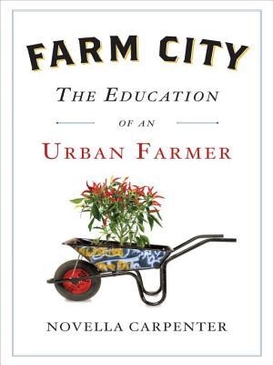Farm City: The Education of an Urban Farmer
Farm City: The Education of an Urban Farmer is a non-fiction book written by Novella Carpenter, published in 2009. The book chronicles Carpenter's journey of transforming a vacant lot in Oakland, California, into a thriving urban farm. Farm City is a testament to the possibilities of urban agriculture and the impact it can have on communities, food security, and individual fulfillment.
Summary[edit | edit source]
Farm City begins with Carpenter's move into a dilapidated apartment in Oakland, where she discovers a vacant lot next to her building. Inspired by her desire to connect with her food sources and contribute positively to her community, she embarks on an ambitious project to cultivate this space. The book details the challenges and triumphs she faces, from soil rehabilitation and crop selection to raising livestock in an urban setting. Carpenter's narrative is not just about farming; it's a reflection on the nature of community, sustainability, and the ethics of eating.
Throughout the book, readers are introduced to a variety of agricultural practices, including permaculture, biodynamic farming, and urban farming. Carpenter's experiment includes raising a range of animals, such as chickens, ducks, rabbits, and even pigs, in the heart of the city. Her story is a blend of personal memoir, urban agriculture manual, and a call to action for urban dwellers to reconsider their relationship with food.
Themes[edit | edit source]
Farm City explores several key themes, including:
- **Sustainability**: The book delves into the concept of sustainable living within an urban environment, showcasing how local food production can reduce carbon footprints and promote environmental stewardship. - **Community**: Carpenter's urban farm becomes a focal point for community engagement, illustrating how shared spaces and interests can bring diverse groups of people together. - **Food Security**: By highlighting the process of growing and raising her own food, Carpenter addresses issues of food security and the importance of access to fresh, nutritious food in urban areas. - **Ethical Eating**: The narrative prompts readers to consider the ethics of eating, particularly in relation to meat consumption, animal welfare, and the environmental impact of food choices.
Reception[edit | edit source]
Farm City received critical acclaim for its honest and engaging portrayal of urban farming. Critics praised Carpenter's witty and insightful writing, as well as her ability to weave together personal anecdotes with broader discussions on food and society. The book has been recognized as an important contribution to the literature on sustainable living and urban agriculture.
Impact[edit | edit source]
Since its publication, Farm City has inspired a new generation of urban farmers and has contributed to the growing movement of urban agriculture across the globe. Carpenter's work has highlighted the potential for cities to become more self-sufficient, resilient, and connected through the act of growing food.
See Also[edit | edit source]
Search WikiMD
Ad.Tired of being Overweight? Try W8MD's physician weight loss program.
Semaglutide (Ozempic / Wegovy and Tirzepatide (Mounjaro / Zepbound) available.
Advertise on WikiMD
|
WikiMD's Wellness Encyclopedia |
| Let Food Be Thy Medicine Medicine Thy Food - Hippocrates |
Translate this page: - East Asian
中文,
日本,
한국어,
South Asian
हिन्दी,
தமிழ்,
తెలుగు,
Urdu,
ಕನ್ನಡ,
Southeast Asian
Indonesian,
Vietnamese,
Thai,
မြန်မာဘာသာ,
বাংলা
European
español,
Deutsch,
français,
Greek,
português do Brasil,
polski,
română,
русский,
Nederlands,
norsk,
svenska,
suomi,
Italian
Middle Eastern & African
عربى,
Turkish,
Persian,
Hebrew,
Afrikaans,
isiZulu,
Kiswahili,
Other
Bulgarian,
Hungarian,
Czech,
Swedish,
മലയാളം,
मराठी,
ਪੰਜਾਬੀ,
ગુજરાતી,
Portuguese,
Ukrainian
Medical Disclaimer: WikiMD is not a substitute for professional medical advice. The information on WikiMD is provided as an information resource only, may be incorrect, outdated or misleading, and is not to be used or relied on for any diagnostic or treatment purposes. Please consult your health care provider before making any healthcare decisions or for guidance about a specific medical condition. WikiMD expressly disclaims responsibility, and shall have no liability, for any damages, loss, injury, or liability whatsoever suffered as a result of your reliance on the information contained in this site. By visiting this site you agree to the foregoing terms and conditions, which may from time to time be changed or supplemented by WikiMD. If you do not agree to the foregoing terms and conditions, you should not enter or use this site. See full disclaimer.
Credits:Most images are courtesy of Wikimedia commons, and templates Wikipedia, licensed under CC BY SA or similar.
Contributors: Prab R. Tumpati, MD

